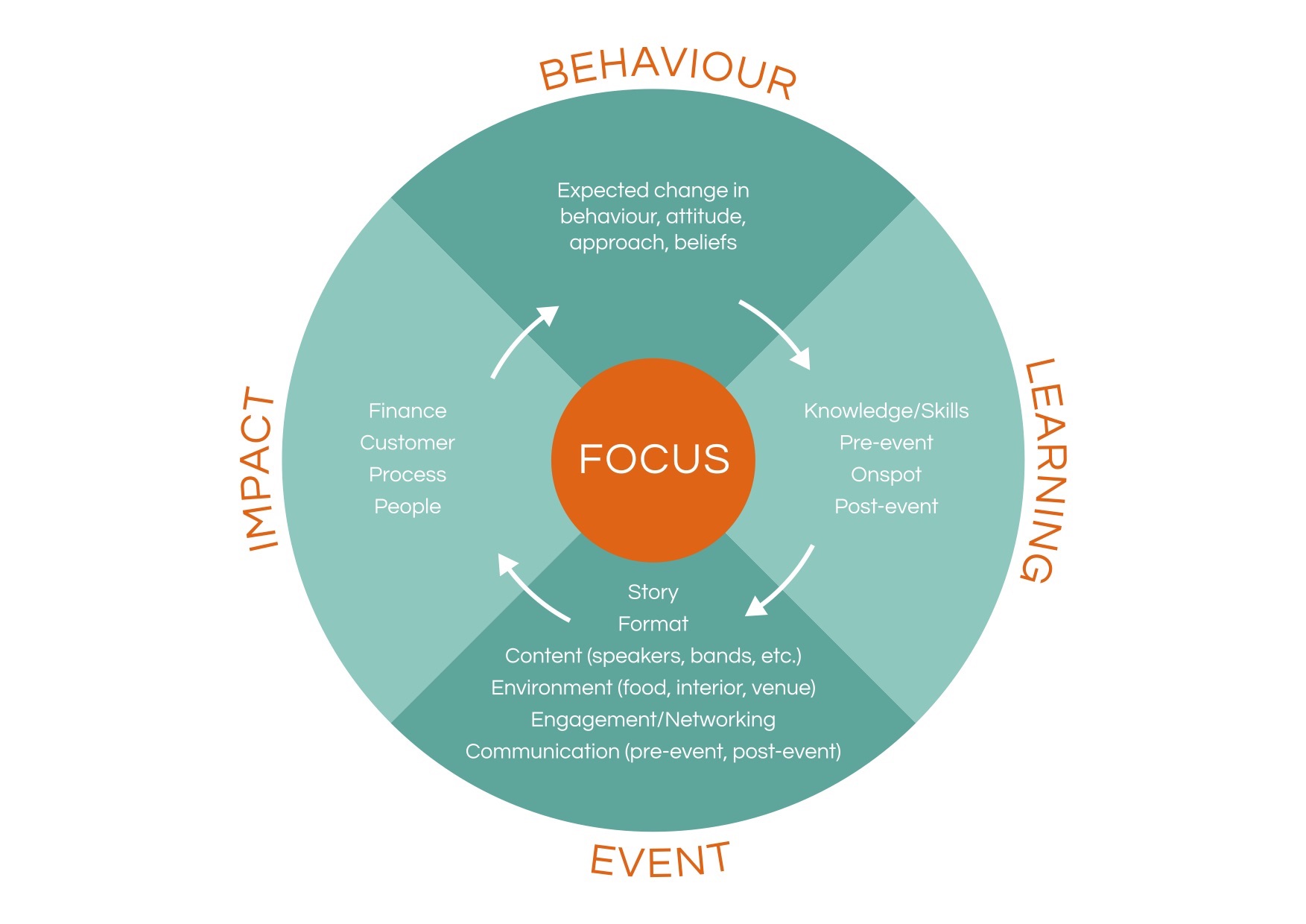Greetings!
As you’ll quickly notice, when planning an event, we consistently return to two critical questions: “why” and “for whom?” These aren’t just age-old truths but conscious emphases. Enjoy reading!
1. Set Clear Goals and Find Ways to Achieve Them
This is the perfect time to define your target audience. Reflect this information within the company—otherwise, this knowledge won’t be fully utilized.
If you can’t answer the questions of why and for whom your company is planning an event, request an audience with decision-makers or management and find a clear answer together. You might find the “Event Impact Cycle” model created by Orangetime and Ph.D. Elina Kallas helpful

2. Assemble a Project Team
If it’s a smaller event, you can handle it internally. For larger projects, consider involving a professional agency.
If you’ve decided to use agency services, here are some helpful tips: do thorough research by reviewing different teams’ experiences on their websites and social media pages, always prefer negotiations and requesting targeted proposals. Long-term relationships yield better results because the client and agency spend less time getting to know each other and building trust, allowing them to focus on achieving goals together.
If you find that a competition is more suitable (or unavoidable) for your company, you can find useful advice on choosing the right partner and sending requests on the Estonian Marketing Communication Agencies Association (ETKAL) website: https://www.turundajateliit.ee/juhised.
3. Create the Event Concept – Different Models (Dinner, Info Session, Conference, or Concert?)
Carefully consider different event categories based on your set goal. For instance, one format might be suitable for sharing information with employees, while another might work better for motivation. Clients could be hosted at a grand reception or divided into smaller groups to engage with each separately. Naturally, hybrid models also work well.
4. Confirm the Date and Find a Venue
By now, you have a preliminary concept, and it’s time to explore where you can bring it to life. Once again, it’s worth considering the objectives, and from that, determine the time and location. When selecting a date, consider public holidays, school vacations, and if possible, avoid competing events.
5. Create a Budget
When preparing the budget, keep in mind that organizing an event is certainly a higher-cost method of maintaining/establishing contact. Therefore, if you’ve chosen this route, remember that excessive skimping isn’t savings—the target audience will unmistakably sense it. If the budget still falls short, it might be wise to find another way to acknowledge the client/employee. If you still want to organize an event, be sure to include a line for “unexpected expenses,” which could be in the range of 10-15% of the total budget. This will leave you a small buffer to adjust the budget as needed.
6. Create the Event Schedule and, if Necessary, a Communication Plan
A detailed schedule is your lighthouse as you navigate the stormy waters of event preparation towards the home port. So, take your time and make the first draft at least a solid four out of five. You must consider your target audience and the most basic human psychology. Be careful not to evaluate content based on yourself, but always think of your guests. Again, I recommend not losing focus on the event’s goals.
4-6 months before the event: You should have the objectives and target audience, date, venue, initial outline, budget, team, and preliminary negotiations with speakers in place.
3-4 months before the event: Finalize details regarding the venue and catering. This includes having a scaled plan of the area, with all critical objects marked. Ideally, you should have gone over details with your other technical partners by this time. If your target audience has busy schedules, you might want to send out “save the date” messages. Create a mini-website for the event with the key details and a registration link for invitees.
1-2 months before the event: Now it gets more interesting. It’s a good time to review the crucial details of the event. If you don’t have signed contracts, it’s worth confirming with key partners that the event will proceed as planned. Who might these key partners be? Certainly, speakers, artists, venue, catering, photographer, hall staff, and key technical partners. Check if the budget aligns with expectations and send out the invitations.
1 week left, and the pressure is on: Ensure your schedule is up-to-date, and everything still seems correct. Confirm the exact arrival and rehearsal times with partners.
1 day to go – help! Actually, you should be the calmest person in the world at this point because everything is planned and agreed upon. Print out schedules—both technical and those for your key personnel. Most likely, the technical setup of the event begins today. Be present to ensure everything goes as planned. Be ready for surprises and resolve them promptly. Make sure technical companies adhere to their schedules because evening rehearsals must start on time. Don’t stay on-site too long—make sure to get a good night’s sleep because tomorrow is The Day.
On the Day: Arrive early and keep a smile on your face. Everything will go smoothly. Conduct two important meetings—one technical and one with your team. In the first, review all critical details concerning the event’s schedule, including sound, video, and stage setup. In the second, brief your company’s key personnel on essential details so they can host guests properly.
Immediately after the event, gather feedback and summarize it. Save this summary in a secure folder and revisit it when preparing for next year’s event. Voila! Done and done!
P.S. This blog post is written based on experience. It doesn’t claim to be the ultimate guide to organizing the world’s best events but rather a handy checklist of important details. Oh, and it wouldn’t hurt to insure your event against unforeseen circumstances or require your partner to do so.
Good luck with your endeavors! And if you’re planning something exciting, let us know—we’ll brainstorm together.
